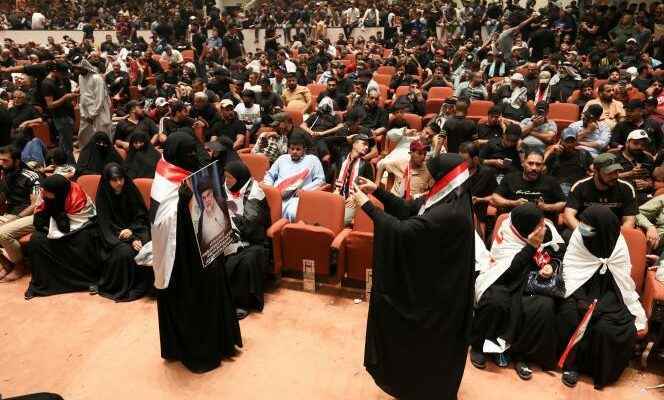For several hours, Baghdadis held their breath on Monday 1er August, eyes riveted on the “green zone”, the district of institutions, in the heart of the Iraqi capital. The organization of competing demonstrations in this perimeter by the rival Shiite factions, which oppose the formation of the government since the legislative elections of October 2021, could degenerate into open confrontation. The show of force of the supporters of the populist leader Moqtada Al-Sadr, from Parliament, and their adversaries of the Coordination Framework, an alliance including in particular pro-Iranian militia parties, confined behind the walls of the “green zone “, remained contained.
At nightfall, after protesting for several hours against the ” Rebellion “ of Moqtada Al-Sadr, whose supporters have occupied Parliament since Saturday to demand new elections and “a radical change in the political system”, the thousands of Coordinating Framework supporters began to disperse. Qais Al-Khazali, leader of the League of the Righteous (“Asaib Ahl Al-Haq”), one of the militia parties making up this alliance, had just called, in a press release, to lift the camp. Despite some scuffles with the security forces guarding access to the “green zone”, discipline had been maintained within the movement to prevent an incursion into the neighborhood of the institutions.
The Coordination Framework did not mobilize as widely as Moqtada Al-Sadr, whose supporters demonstrated in large numbers in Baghdad as well as in the Shiite southern provinces. He failed to oppose it with a united front. Calls for restraint have multiplied within the alliance, divided on the response to be given to Mr. Al-Sadr’s provocations. In messages relayed on social networks, certain factions suggested that they would not take part in the demonstrations, like the Hezbollah Brigades, a militia close to Iran, and Hadi Al-Ameri, the leader of the Badr organization, which urged rival factions to resolve their differences through dialogue.
Finding a compromise
Playing on these divisions is at the heart of Moqtada Al-Sadr’s strategy to impose a compromise that is favorable to him. On Monday, a Sadrist current official responded to Mr. Al-Ameri’s call by suggesting that he leave the alliance and support Mr. Al-Sadr’s call for a reform of the system. The message once again pointed an accusing finger at former vice-president Nouri Al-Maliki, a pet peeve of Moqtada Al-Sadr, who is accused of wanting to dictate his views in forming the government and inciting escalation against the populist leader, with the leader of the League of the Righteous militia, Qaïs Al-Khazali.
You have 45.13% of this article left to read. The following is for subscribers only.
